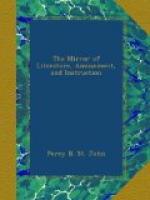ANNE OF GEIERSTEIN, or THE MAIDEN OF THE MIST
A novel. By sir Walter Scott, Bart.
The author of this delightful novel, by the fertility of his genius, has almost exhausted the rhetoric of admiration, and even the vocabulary of criticism. But we still hail his appearance with heartfelt interest, if not with the enthusiasm and rapture with which we were wont to speak of his earlier productions. The incognito of their authorship is removed, but with it none of their genuine fame; and, like few works of the same class, their popularity bids fair to outlive hundreds of matter-of-fact works, whose realities might have been expected to ensure them a more durable character. It would be idle, at this time of day, to go over the ground upon which the Waverley Novels will take their stand among our national literature: they are not merely pictures of fact and fancy blended by a masterly hand, but beyond this merit, they abound with so much knowledge of the human heart and the mastery of its passions, as to render them interesting to every reader beyond Robinson Crusoe; and above all, the free, conversational style in which this knowledge is imparted, is one of their greatest attractions. The author does not account for effects by any tedious appeal to our judgment, but he strikes at once at our feelings and common sense, and we become, as it were, identified with the dictates and impulses of his heroes. This merit belongs to book-effect, as situations belong to stage-effect; the endings of his chapters are like good exits—we are sure to be curious as to the following page or scene.
But we are trifling, like a subordinate who stays behind to say a silly thing in a farce. Having overrun Scotland, England, France, Palestine, and Germany, Sir Walter, in the work before us, introduces us to some of the most stirring times of Swiss story. Upon this simple intimation, the reader will anticipate all the fascinations of picturesque scenery and eloquent description—so characteristic of every volume of the Waverley Novels, and in this expectation, he will not be disappointed. The latter charms are constant in nothing but perpetual change; and the sublimities of Switzerland will excite admiration and awe, when the labours of man have crumbled to ruin, and all his proud glories passed away in the dream of time.
The novel opens in the year 1474, when Helvetia, after her heroic struggles for independence, began to be recognised by the neighbouring countries as a free state. At this date, its inhabitants “retained, in a great measure, the wisdom, moderation, and simplicity of their ancient manners; so much so, that those who were entrusted with the command of the troops of the Republic in battle, were wont to resume the shepherd’s staff, when they laid down the truncheon, and, like the Roman Dictators, to retire to complete equality with their fellow citizens, from the eminence to which their talents, and the call of their country had raised them.”




